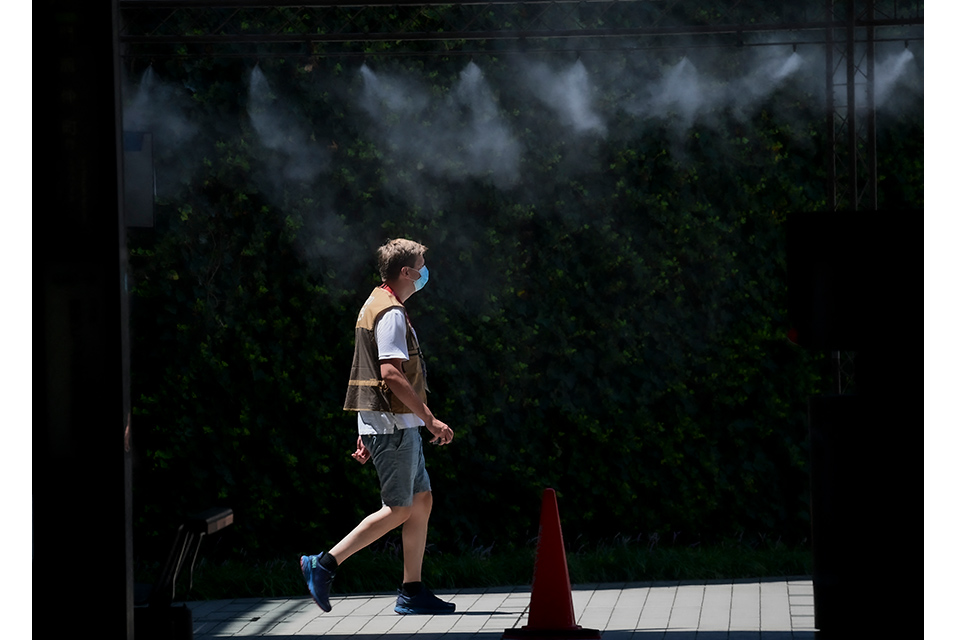WASHINGTON, DC (AFP).- With the Delta variant pushing US Covid cases back up, fully vaccinated people are wondering whether they need to start masking indoors again.
Covid vaccines remain extremely effective against the worst outcomes of the disease -- hospitalization and death -- and breakthrough infections remain uncommon.
But experts told AFP that one size doesn't fit all, and people should consider factors like community transmission, personal risk levels, and their own risk tolerance to help decide what's right for them.
Risk low for vaccinated
The Centers for Disease Control and Prevention dropped its mask guidance for vaccinated people in May.
At the time, cases were plummeting and the administration of President Joe Biden was keen to declare a return to normal on the back of a vaccination campaign that was still going strong.
On Thursday the country registered more than 50,000 cases, a surge driven by the now overwhelmingly dominant Delta variant, the most contagious strain to date, and centered in low-vaccination regions.
Crucially, however, the rise in cases has been largely decoupled from hospitalizations and deaths.
With 80 percent of seniors fully vaccinated, average daily deaths remain in the 200s -- much lower than the more than 3,500 deaths per day seen in the worst wave over winter.
More than 97 percent of hospitalizations are among the unvaccinated, CDC director Rochelle Walensky said last week, while 99.5 percent of people dying were unvaccinated, Surgeon General Vivek Murthy said last weekend.
Walensky defended the unchanged mask guidance Thursday, stressing the agency has always said communities and individuals should consider local conditions.
"If you're in an area that has a high case rate and low rates of vaccination where Delta cases are rising, you should certainly be wearing a mask if you are unvaccinated," she said.
"If you are vaccinated, you get exceptional protection from the vaccines. But you have the opportunity to make the personal choice to add extra layers of protection if you so choose."
Why local conditions matter
Joseph Allen, an associate professor at Harvard's TH Chan School of Public Health, said he supported the CDC's view.
While the World Health Organization has urged fully vaccinated people to continue to wear masks, that is in light of the global situation where just 13.4 percent of the world population is fully vaccinated.
"I just don't think we're at the phase in the US and other highly vaccinated countries where this top-down blanket guidance makes sense anymore," he told AFP.
"For me, the goal is and has always been with all the vaccines to prevent severe disease, and death, and that's exactly what they do really well."
As far as breakthrough infections go, a recent study of a US prison found 27 positive cases from 2,380 vaccinated individuals, or 1.1 percent. All were asymptomatic and detected through routine screening.
Research shows that asymptomatic people are less likely to transmit, while people who develop symptoms are supposed to self-isolate.
Still, the greater the community prevalence of the virus, the more likely such breakthroughs become.
People's personal risk levels vary by their age and underlying conditions, some people may have high risk people at home they want to protect, while some just have lower risk tolerance.
On and off ramps
The divergence in case levels across the country closely correlates with vaccination rates, and parts of Missouri, Arkansas, Louisiana and Florida are currently experiencing the worst spikes.
Celine Gounder, an infectious disease physician and epidemiologist, compared the situation prior to Delta surges to driving your car in your own neighborhood, while the current scenario is closer to driving on a race car track.
"When you're driving around in your neighborhood, a seatbelt is enough," she told AFP, with the seatbelt representing a vaccine.
"But if you're driving on a NASCAR race track, in addition to seatbelts, those drivers also have helmets, they have airbags," she added, emphasizing that masks add an additional layer of protection.
Even without the CDC, some parts of the country, like Los Angeles County and Philadelphia, have reinstituted mask guidance.
Monica Gandhi, an infectious disease doctor at UC San Francisco told AFP she has been advocating for statistical benchmarks, "as the back and forth is very frustrating for people."
She suggests tying mask mandates to the local hospitalization rate -- a more reliable measure of disease prevalence than cases -- and, along with other experts, has proposed fewer than five hospitalized cases per 100,000 people as the threshold for resuming normal activity.
Gandhi, Allen and others argue such "off-ramps" can also be applied to schools when they reopen in fall, while the American Academy of Pediatrics favors universal masking, even among vaccinated teachers and students.
© Agence France-Presse










